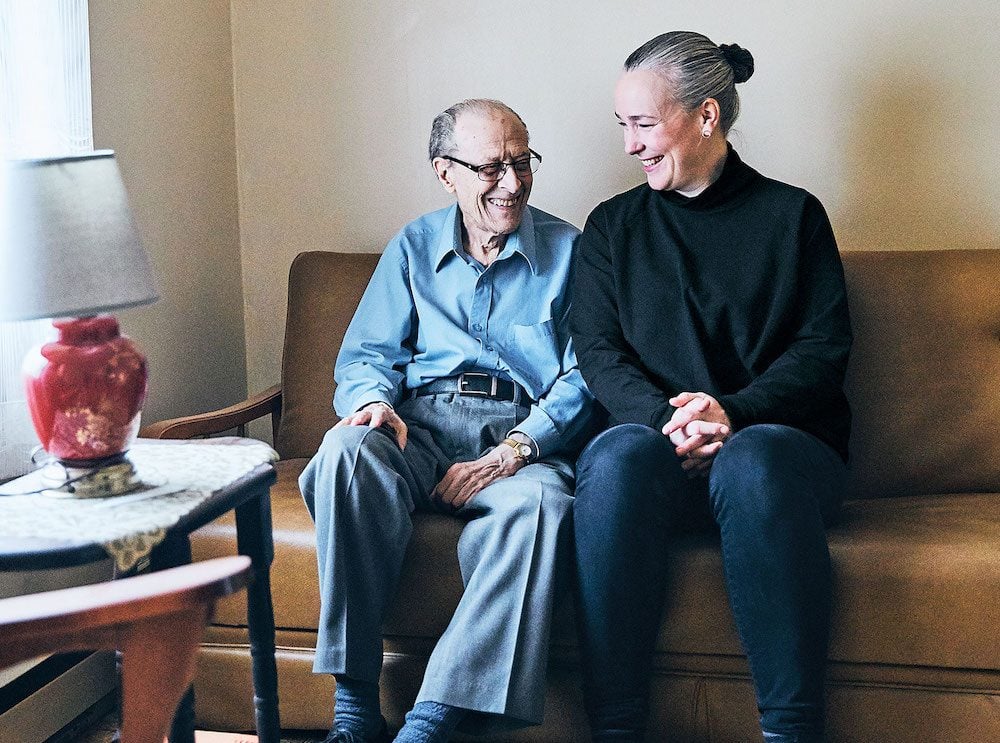How to Communicate Effectively With Your Elders
Don't let an age gap stand in the way of close friendship and entertaining conversation. Here are easy ways to build bonds across generations.

Friends of all ages
Older people tend to like me. I’m a good listener and a big talker, and I know my way around a cup of tea and a stiff drink. I tend to like older people, too—which is handy now that the average age of my family members, spouse and siblings aside, is hovering around 80.
Because I’m based in a different province than my elderly relatives, my primary role in their lives is conversing, not caretaking. The same dynamic applies to my relationship with my 89-year-old friend Raoul Gagnon, whom I met through Les Petits Frères, a Montreal organization committed to reducing social isolation among seniors. Every week for the last five years, we’ve gabbed in the kitchen of his walk-up apartment. While I can happily chatter away with Monsieur Gagnon and my family about everything from travel to politics to childhood memories, I sometimes wonder how well I’m holding up my end of the bargain. Are they getting what they need out of our chats? Is there anything I should be doing differently?
One thing is certain: the time has come for us all to build meaningful connections with our elders. According to StatCan data, there are now more Canadians over the age of 65 than there are under the age of 15—and their numbers are rising quickly. A decade from now, nearly one in four Canadians will be a senior. So here are some practical strategies to ensure everyone can make the most of intergenerational confabs—now and in the future.
Avoid stereotypes
We often attribute a person’s behaviour to the most obvious thing about them—and age is an especially visible trait. According to Verena Menec, a professor at the University of Manitoba in the department of community health sciences, that’s a mistake. “Just because someone is older, don’t assume that they don’t know what’s going on in the world or that they have dementia or hearing issues,” she says.
If an older person doesn’t respond to a question or comment, it’s possible that they simply weren’t paying attention. Presuming that their reaction is somehow tied to their age can lead to what Menec calls “elder speak”: talking very loudly and very slowly, and even engaging in baby talk. Addressing seniors in this patronizing manner can quickly become an irritant for them.
Stereotyping in this way is ageism, says Menec. Rather than immediately generalizing, focus on the individual. Observe them. Not everyone wants to be drawn out—some older people are happy sitting quietly.
Also, keep in mind that someone’s potential physical frailty doesn’t necessarily dictate their level of interest in new technologies or their desire to discuss current events. Approach them in the same way you would a younger person and then adjust if necessary.
Slow things down
Although Menec cautions against taking a young-versus-old approach, she does acknowledge that young people have a tendency to use jargon and to speak quickly and without pauses. “I keep telling my research assistants to ease up and take a breath,” she says. “As people get older, the conversation pace often slows down slightly. Wait a moment after speaking and allow the other person to gather their thoughts.”
That give and take is an essential part of conversation, agrees Dr. Yael Goldberg, a neuropsychologist and clinical psychologist at Baycrest Health Sciences in Toronto. The centre is a global leader in geriatric care and brain health, and Goldberg is a frequent witness to, and participant in, intergenerational dialogue. “Being a good partner is key,” she says. “Make sure to take the time to establish eye contact and double check that you have someone’s attention before launching into whatever you need to say.”
Although not every senior experiences significant auditory issues, some amount of hearing loss is common as we age. With that in mind, it’s best to avoid distractions such as the TV or the radio, or noisy public spaces like restaurants, which increase the possibility of misunderstandings. If someone is hearing-impaired, it can be difficult for them to follow a conversation in a crowded room when there’s more than one speaker. If you want to chat, Menec advises moving to a quiet corner or ensuring that visits occur within intimate group settings.
Focus on their interests and strengths
When there’s a 50-year gap between you and your conversation partner, it’s tempting to believe that you won’t be able to relate to one another. Push that assumption to the side as best you can. “Personhood should be your lens,” says Goldberg. “Remind yourself, ‘This is a human being in front of me. How can I connect with them?’ One of the best ways to do that is to engage them in conversation about their interests and hobbies.”
Capitalizing on the older person’s strengths is useful as well, says Goldberg: “These are people who have more life experience than us.” When it comes to my own relatives, that is abundantly clear. Each of them lived through the Depression and war, faced serious illness and loss, dealt with professional ups and downs. There are few matters I’d hesitate to bring to them—recent topics include work struggles, home renovations and financial planning. And while I may not always take their advice, I almost always trust it.
According to Goldberg, these kinds of in-depth exchanges can make a difference in an older person’s life. Often, seniors don’t have as many interactions in their day-to-day as they did when they were employed, for example. “Those moments provide them with a sense of belonging and mastery,” she says.
In 2018, the Canadian Longitudinal Study on Aging—a long-term investigation that is following 50,000 people between the ages of 45 and 85 for at least 20 years—released its first report. Among the key findings was the correlation between loneliness and depression in older adults. Socializing, whether in the form of small talk or longer conversations, can help counter that.
That alone is a good reason to foster connections with the older people in your life or to reach out to strangers. But in my case, it’s not the only one. As my family members and Monsieur Gagnon age, and our chats carry on, I realize just how much I gain from those talks, too. I value the perspective they provide and the bonds that have been strengthened. Carving out quiet moments to share and connect has been a gift.
Tired of small talk? Here’s how to turn any conversation into a meaningful one.



